#Star Wars fans that judge and bully people for liking any part of the series deemed ‘bad’ or ‘not true star wars’ dni 🥰
Text
Woah! It’s been a while!
So. Sorry about being gone, burnout is horrible. But while I’ve been gone, I’ve been binge watching the clone wars series! I’ve always been a big Star Wars fan, love the movies and the new stuff.
As I was watching the series I thought about making Star Wars OCs, and then… that’s what I did!
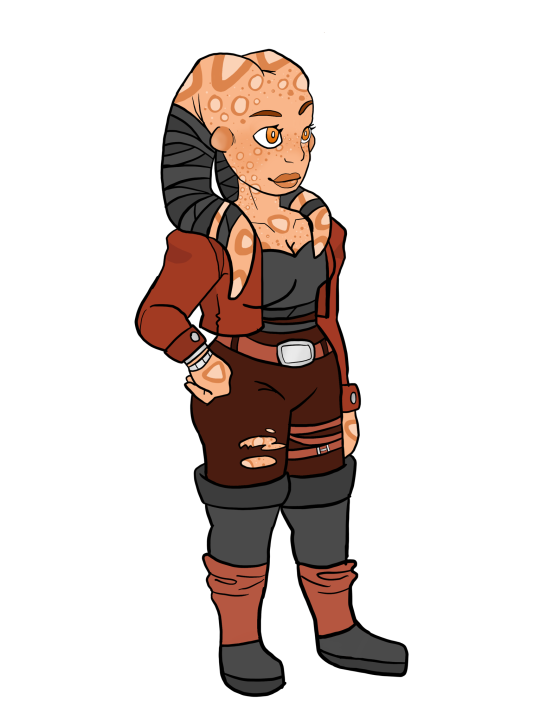
This is Chiddopi, she’s the favorite! I use her for everything, tbh.
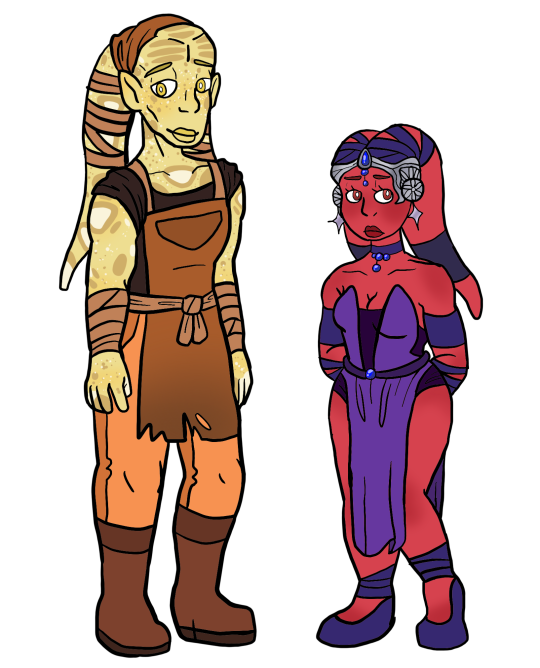
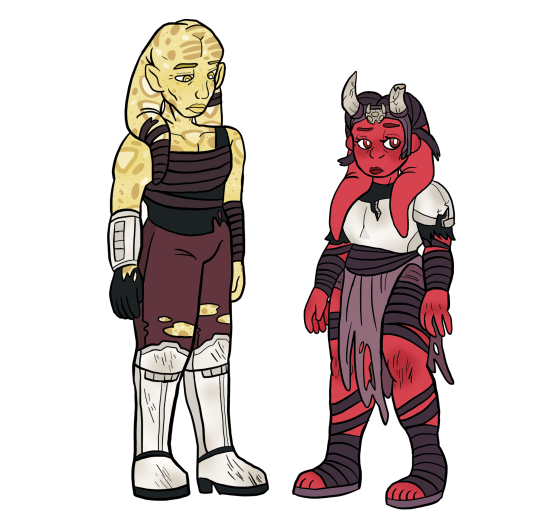
These are her parents before and after they were stranded on a remote planet for about 30 or so years. Her dad (left) is named Dun’cucra, and her mom (right) is Isufo
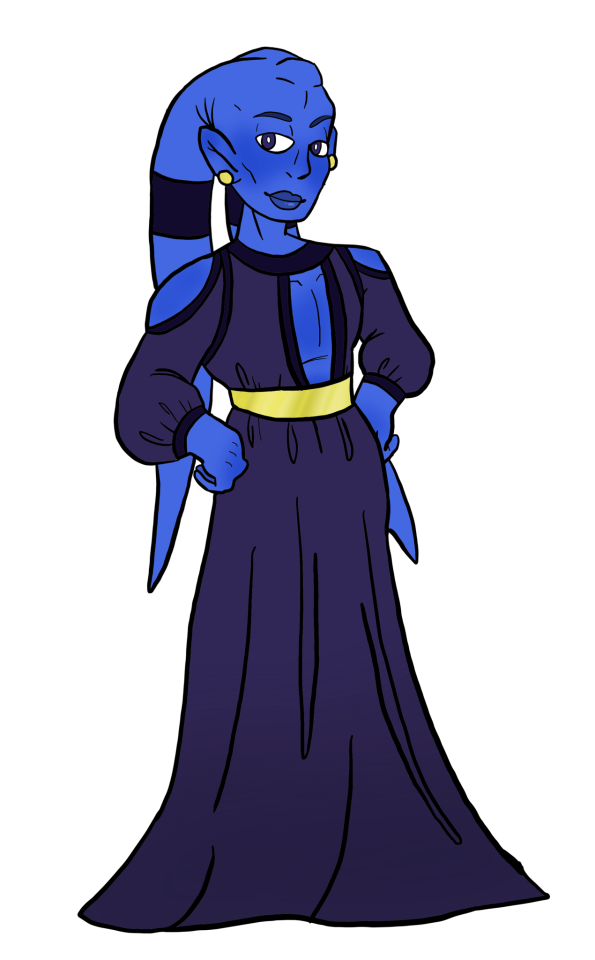
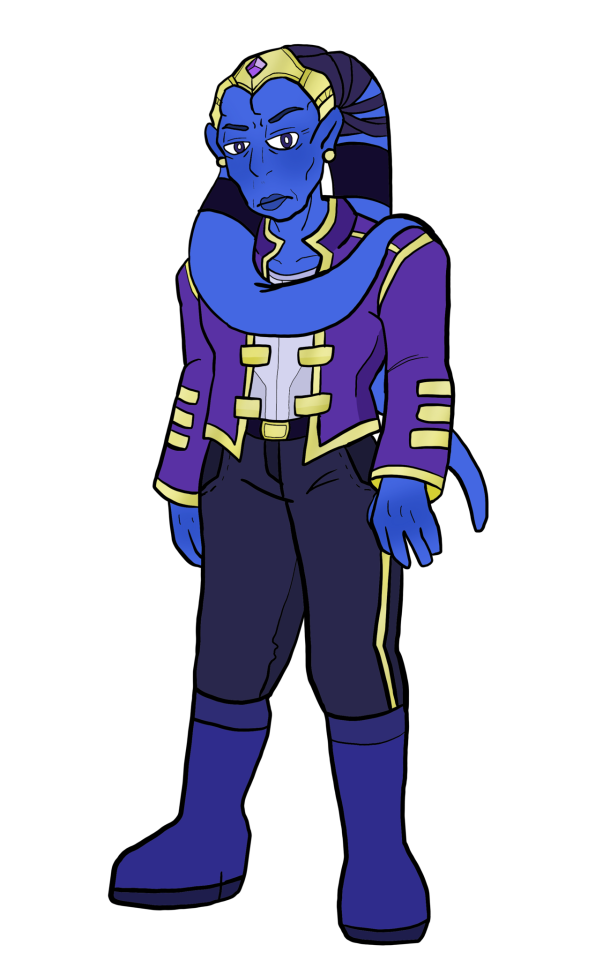
This is Kadira before and after he moved to Coruscant after a failed arranged marriage to Isufo
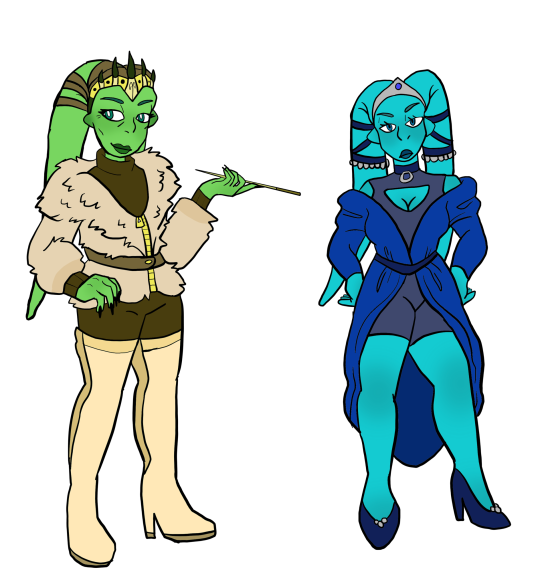
This is Vrusos (left), the lady Kadira married once he was on Coruscant, she owns a crime syndicate, and that’s the kid they have, Xubree (right)
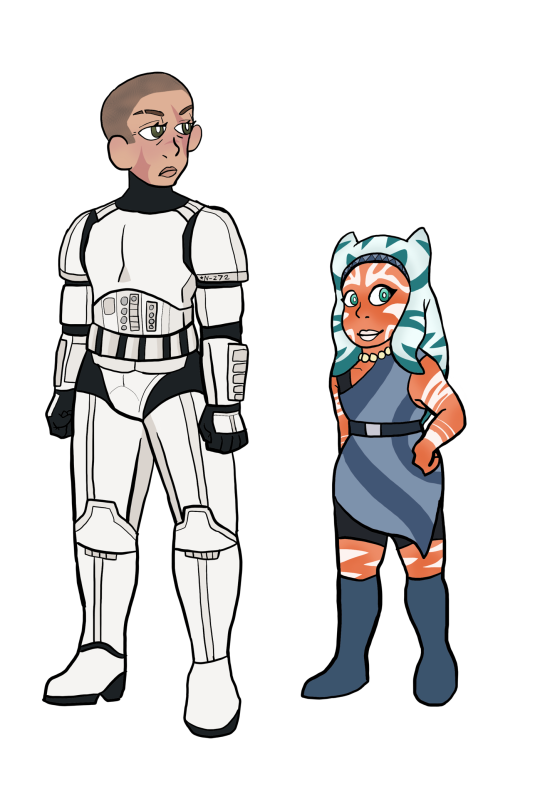
This is Genjol Portsey (left) and her adopted kid Tukraa Meziir (right). Genjol is the luckiest storm trooper alive, i.e. she survived serving the empire, Moff Gideon, and the first order. Her kid however is a huge rebel fan.
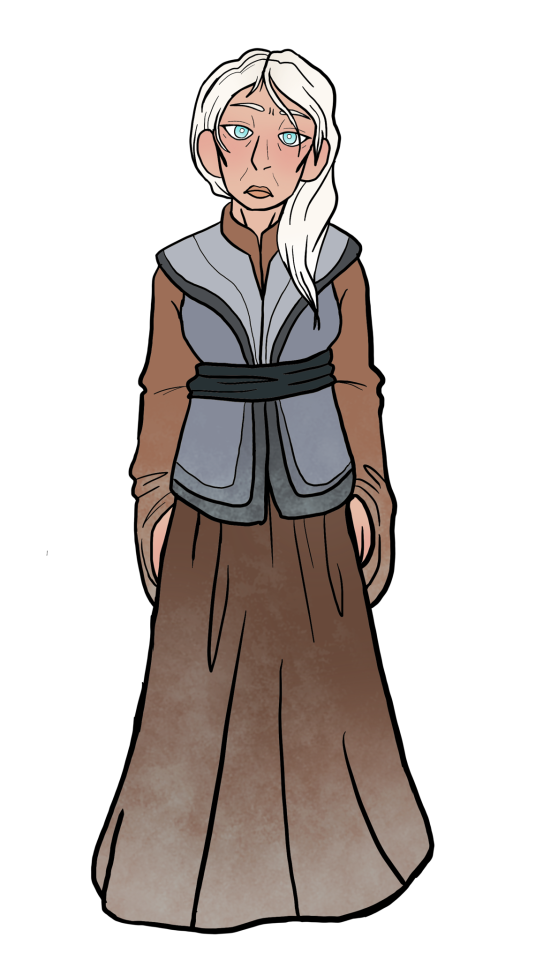
This is Martea Dutlen, a forgotten Jedi that isolated herself on Hoth to study right before Order 66 happened.
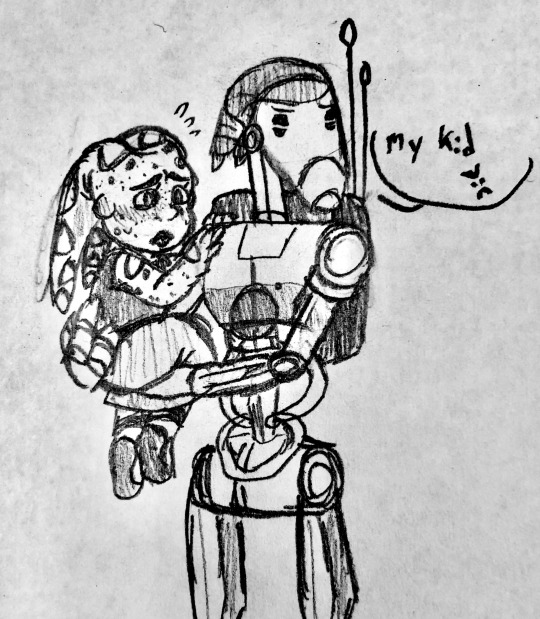
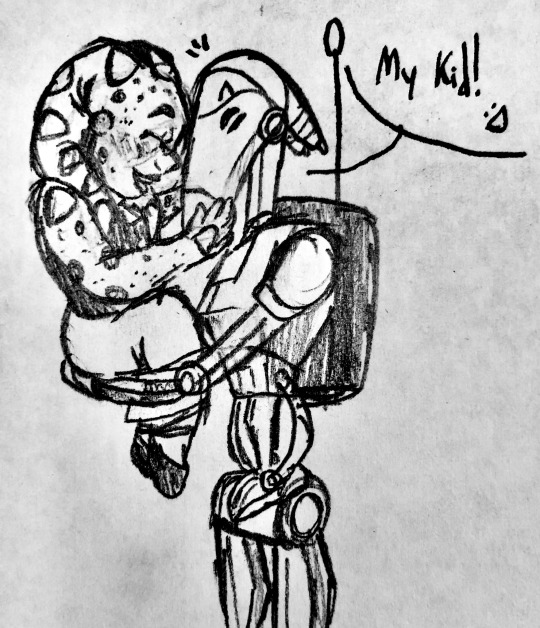
Also Chiddopi was mainly raised by 2 repurposed B1 battle droids her parents owned since they were stranded on that planet. She later gets a Droideka when she’s older but I hate drawing them, as I’ve learned.
The droid with the spot is named B1-882, nicknamed “BB” or “BB-2”, The standard droid is named B1-780, nicknamed “Eighty”, and she named the Droideka “Dekki”
#my art#star wars#star wars the clone wars#star wars rebels#star wars visions#the mandalorian#the mandalorian s2#the book of boba fett#star wars oc#Jedi#twi’lek#togruta#storm trooper#b1 battle droid#droideka#love these guys 💙#also if you can’t tell I love Twi’leks.#Star Wars fans that judge and bully people for liking any part of the series deemed ‘bad’ or ‘not true star wars’ dni 🥰#obi wan kenobi#star wars kenobi#kenobi 2022
42 notes
·
View notes
Note
You know I was watching a video by overly sarcastic productions and I’m pretty sure that from that definition Adrien is a Mary Sue. The episode was Trope Talks: Mary Sues.
Pretty much Adrien is this to a T.
I hear people throwing the term around a lot and complaining about the term being thrown around a lot but I think what ends up being missed is what actually constitutes a Mary Sue in the first place.
A Mary Sue is not a character who is overpowered or “too strong” like the complaints about Captain Marvel. If that was true, then literally every anime protagonist or super hero that exists is a Mary Sue by default. Every one. Ever.
Nor is it someone with a tragic backstory like Batman or any other long line of superheroes or anime protagonists. Whether it’s dead parents, a past trauma, abuse, bullying, or just a conga line of horrible circumstances, plenty of characters have had bad things happen to them. That’s kind of part of life and what makes them relatable and sympathetic.
It’s not even someone who is loved by many people. Or is a good judge of character. Or whom manages to talk someone into a heel-face turn. Regardless of what claims may come, these are not what make a character a Mary Sue.
What makes a Mary Sue—the central core aspect of what makes a character problematic all boils down to how the narrative itself treats the character.
The narrative is generally indicative of the author’s own preferences or leanings. We see it all the time with stories that create straw characters to symbolize people the author doesn’t like or things the author doesn’t agree with in order to belittle it. The opposite can just as easily occur where a character or position is hyped up to look better or promote what the author wants promoted.
Those previously mentioned tropes are a sign of that. For a Mary Sue, everything from powers to past traumas to relationships are all just “things“ for the character to have. Whether to emphasize their importance or to highlight their greatness. While they’re not necessarily what automatically makes a character a Mary Sue, they are often utilized as tools by the narrative for the sake of propping the character that is a Sue. That’s why they’re easy to pick out and attribute to a Mary Sue as well as used to claim characters are Sues. Because they are tools used to try to make people support a character instead of actually making a character people can like and WANT to support.
A Mary Sue is given powers for the sake of making the character awesome without the character actually doing anything to be awesome. A Mary Sue is is given a tragic backstory for the sake of making the character sympathetic without the character actually doing anything to warrant sympathy. A Mary Sue is given relationships for the sake of being the center of attention and adoration by other characters to shell how awesome they are without having to do anything to show how or why anyone would or should actually like them. Any relationships a Mary Sue has are NOT legitimate connections between two or more people, they’re just labels to slap on the Mary Sue to make the character seem more relevant and important.
Ultimately, a Mary Sue supplants the story for the sake of having this character BE the story, and it’s a major reason why they are despised in most fandoms. A reason that, sad to say, was actually deserved in the early days of fan works.
That said…
Adrien IS a prime example of a Mary Sue because of the way the narrative is going out of its way to portray him. Even the creator has come out and said he is “perfect” and that any flaw he could have isn’t actually on him so much as an indication of something being wrong with the world around him. Anything bad that happens, even as a direct result of that character’s own actions, is portrayed as being the fault of anyone and everyone else but that character, in this case Adrien. That, RIGHT THERE is pretty much the epitome of what a Mary Sue IS.
Some call it an ego trip. Some call it a power fantasy. Many consider it as a sort of reality warper. It’s ultimately the case when the story is being turned in on itself to make this character look good without the character actually DOING anything to BE good and even when the character is specifically doing things that AREN’T good.
This is why Bella Swan from Twilight is a certifiable Mary Sue.
This is why it can be argued that Rey from Star Wars is a Mary Sue.
This is why Anita Blake is definitely a Mary Sue.
And this is what separates Adrien from Marinette. And Adrien from pretty much everyone else in the series.
It’s not that he has superpowers—if anything, I think he got cheated in the powers department, all things considered. No, it’s the way he doesn’t seem to take those powers or the responsibilities that come with them seriously. Given that he has had THREE instances already in which he threw a major fit in the middle of an akuma battle because he wasn’t happy about something only for him to be shown as being RIGHT to do so even to the detriment of his partner, his Miraculous, and ultimately all of Paris.
It’s not that he has a missing mom and a neglectful dad, it’s how the narrative keeps emphasizing how sad Adrien is without actually DOING anything with it so they can milk the “Sadrien” angle. Because let’s face it, seeing Adrien looking sad sells.
It’s not that he has multiple girls who like him. I mean, he’s a model, and is rich and famous. I’d be surprised if he didn’t have multiple girls who were into him.
No, it’s in the over the top emphasis of his supposed greatness. It’s in this consistent impression the narrative is giving that the female lead we are supposed to be rooting for—whom we all KNOW has gone well out of her way to do things for him, try to make him happy even to her own detriment, and has struggled more than any rational person should be willing to just to try confessing to the guy is somehow the one side of the love square that “isn’t trying hard enough”.
It’s in the way he is always portrayed as being the “moral voice” and the one in the right in any situation regardless of how little he’s involved or even understands what’s going on. Whether it was lecturing people on how to deal with a bully or for being happy when their bully was leaving (when he was never actually a target of that bully). Or lecturing people on how to deal with a liar (when again, he wasn’t the one being played or threatened). Or threatening to quit when Paris was flooded by an akuma all because he wasn’t being told secrets that he wasn’t showing he was ready to know and that his tantrum CERTAINLY didn’t show he was ready or mature enough for.
It’s in the back and forth on whether he is supposed to be the epitome of “perfection” and the wise person everyone should listen to only to suddenly be made out as the innocent victim of everyone else when his less than noble or heroic behaviors are pointed out in order to excuse or justify his behaviors. (I call it the Standard Adrien Defense and it follows this trend each time.)
It’s in the clear and blatant double standard between what Adrien/Chat is allowed to do and get away with vs what is allowed from anyone else. It’s in the way that Adrien can do things that anyone can agree is wrong without getting so much as a lecture but anyone else in his place will—and have been raked over the coals by the same narrative that gives him the equivalent of a pat on the head and a cookie.
It’s in the way he’s just…there. He has the plot connections. He has the relevance. He has the position of being at the center of quite literally everything from the villain’s plans and motivations to the adoration of the female lead…and he does NOTHING with any of it.
And it’s in the way that no matter what he does or what side he takes, the narrative always ALWAYS frames him as being the one in the right when there’s a conflict, the one to sympathize with when he and another character are hurt, and the one we as the audience are supposed to agree with and support more in any situation.
And the truly sad thing is that Adrien as a character has potential. From a humorous character to a serious one, from the wise and introspective person to the wide-eyed innocent being thrown into the hero job, there was SO MUCH that could have been done with his character. Instead, Adrien is reactionary. Anything involving him is less a matter of what he personally is doing and more about what is being done to or for him. He has no dreams or aspirations other than being with the main female character, has no interests to speak of, and his other relationships actually seem pretty lacking—again, based less on what HE’S doing and more on what other people are doing to and/or for HIM. He somehow has a wide-ranging impact without actually taking action.
As it stands, Canon Adrien is about as real as the cardboard cutout or wax statue of him. To the point he might as well be either for all that he actually seems to accomplish. Because nothing annoys fans or creates salt quite like wasted potential, and that’s all canon Adrien is at this point.
That’s why Fandom Adrien is awesome, whether he’s portrayed as being dense as a brick, showing a polite exterior while internally screaming, acting like a massive dork, or just acting passive aggressive in how he deals with his father and people like Chloe or Lila. Because however way he’s being made to deal with the crazy situations the fans put him in, he’s at least doing SOMETHING besides standing there and looking pretty for people to fawn/fight over.
Strangely enough, this may be the first case I’ve seen where fans have taken a Mary Sue and made him a real character rather than the other way around.
#ml salt#adrien salt#adrien is a mary sue#yes he is#no pointing at marinette is not a valid argument#no claiming marinette is also a sue is not a valid argument either#nor is it true#no citing adrien's abuse is not a valid argument#nor justification for anything he's done and not done#stop using it#it's getting old#Standard Adrien Defense#mary suedrien
2K notes
·
View notes
Text
Scourge the Hedgehog: The Bad Fanfic Apotheosis
Y’all are gonna hate me for this one.
This is something of a followup to my previous post, Fiona Fox: Depth vs. Prominence, and inspired directly by the discussion I had with a friend in the comments section of the DA upload of it.
Part 1: Fanfic vs. Canon- Genesis of the Recolour
Elements of the Archie Sonic the Hedgehog comic have long been compared to a bad fanfiction, particularly the parts of the story written by Ken Penders, though other writers like Bollers, Chacon, and Flynn have drawn that label too. I'm one of the people that's done it, and that's largely because I hold fanfic and official material to very different standards. There are certain things you can do in fanfic that you can't do in official material, especially with franchises like Sonic, and especially with more niche parts of said franchise, like a comic series.
Of course, there are also certain things you can do in both, but you probably shouldn't. And Scourge is one of them.
What exactly the process behind Scourge's creation was is something that's been debated. For a lot of people, he's considered to be a parody of the then-rampant "Sonic Recolour" fad, wherein fans would take screenshots of Sonic X, and other official artwork, and then edit it in Microsoft Paint, or another similar program, to create their own characters and stories.
Now, this was long decried by other fans, myself included, as incredibly lacking in creativity and originality. It also had an "Ew, cringe" reaction, due to the often-shoddy editing, text-to-speech voices, and usually some top-tier mid-2000s Nu Metal for the music.
These days, it's much easier to look back and say "These were mostly made by kids who were just having fun, and it's completely harmless", and it becomes apparent that a lot of the people that were making fun of them and criticising them were grown men, at which point you kinda realise that this "internet fad" was basically just bullying a bunch of children for not being up to the creative standards of some adults.
Everybody was looking for the next Chris-Chan, but Chris-Chan is a near-unique entity, as only one other person alive has ever managed to combine that sheer void of talent with a monumentally repulsive personality, and that person is Ken Penders.
But Sonichu is the least interesting thing about Chris, and Chris became the laughingstock that he is because of his inability to avoid posting his entire life on the Internet, which was something of a rarity in those halcyon days before the rise of modern social media. Sonichu was a gateway to the actually interesting content also on his channels, whereas these recolour-creators didn't have anything like that, just endless Windows Movie Maker slideshows. And, like, Chris was in his 20s when he became the Internet's punching bag for the first time, and while he's a horrible person, so were the people that dedicated their time and effort to trolling him- His story is fascinating, but it has no heroes.
And into this collective cocktail of grown men shitting on preteens, so Ian Flynn introduced Scourge the Hedgehog.
Is Scourge a parody of Sonic recolours? I sincerely hope not.
The reason for that is twofold, and I'll discuss how his portrayal generally doesn't seem to be mocking those tropes further down the page, but the second issue with the idea that he is a parody is best explained by Sir Terry.

Parody can never punch down, and as a then-24 year old man writing official canon for a franchise, mocking a bunch of 10 year olds on the Internet for making bad stories would definitely be punching down.
And, as I said, nothing about the way Scourge is written is in any way poking fun at the tropes of these fancharacters and stories. It's pretty much all played completely straight. So not only do I hope Ian wasn't trying to mock these fancharacters, but there's also little reason to believe that he actually was.
He's not a parody, he is a send-up.
And on the one hand, it's kinda nice to throw a bone to those kids. But on the other hand... is Scourge really the character you want to represent your part of the fandom in official material? A cruel, violent, abusive, vicious monster that spends his time palling around with a girlfriend that the writer reforged to be the most unlikable character in the entire comic? Yeah, can't say that's what I'd want if I were one of those people, but he seems to be popular enough, so maybe I'm in the minority there.
But now we get to the meat of the problem.
You see, the way Scourge is written is one of those things that you can do in fanfic, but you shouldn't do in canon.
Part 2: What is a Mary-Sue?
The term "Mary-Sue" gets thrown around a lot these days. It's gradually lost all meaning, and has slowly become a term for "Female character that I don't like," mainly used by whiny, easily-offended Broflake Youtubers, who get all pissy that Star Wars films aren't specifically catering to them, to the point that you only have to make a girl be good at something in a movie and these pissbabies lose their shit.
I liked Episode VII and VIII more than I, II, or VI, get fucked.
But what, then, is a Mary-Sue? And why is it relevant to Scourge?
The answer to that first question is a lot more complicated than it might seem. Not just because there are now several different varieties of the trope, but also because the trope itself evolved as it began to be applied to non-fanworks, and additionally because the name itself is somewhat non-indicative. A male Mary-Sue can exist, though these are normally referred to as "Marty-Stue" or "Gary-Stue", or more cynically "The Protagonist". Check out the average Batman comic these days and you'll see what I mean.
Originally, the term applied only to a self-insert character in a fanfic, that was an overly-idealised version of the author, dramatically overpowered, hugely popular, normally dating whichever member of the cast the author wanted to bone, or sometimes multiple partners at the same time, along with a few other traits. It's actually pre-Internet term, originating in a Star Trek fanzine when "Mary-Sue" was created as a parody of other fans' similar characters.
Over time, the trope evolved to the point that, while the "author avatar" feature is still a pretty big indicator, it's not really necessary. So while there are probably plenty of people out there who want to be Batman, not every character that is a Mary-Sue is someone for the author to project themselves onto, and not every author avatar is a Mary-Sue.
Generally, the important features of a Mary-Sue are now:
1) Receives a great deal of favouritism from the author
2) More powerful than the rest of the cast, often to the point of absurdity
3) Faces zero consequences for their actions.
4) Liked by characters that have no reason to do so
5) In a relationship with a character that has no reason to date them, previous relationships be damned.
6) Most importantly, the story will bend over backwards to give them easy wins, even in situations where they logically should struggle.
You're probably starting to get where I'm going with this, and if you're not...
Part 3: Creator's Pet
Scourge is a Creator's Pet.
He gets shown a fair bit of favouritism from Ian Flynn, primarily the guise of how much focus he gets.
Scourge is the most prolific villain in Ian's run, aside from Eggman himself. While other, better villains like Mogul and Naugus were being imprisoned repeatedly until one retired and the other became a dog, and a huge chunk of the comic's remaining antagonists were being subsumed into the Eggman Empire, Scourge was only moving up, not only being the villain of Ian's first two issues on the book, but continuing to make sporadic appearances for the next twenty issues, before appearing as the new leader of the Destructix under Finitevus in the Enerjak Reborn arc, followed swiftly by a stint as the Big Bad in Bold New Moebius. Does he actually deserve this level of importance? You be the judge, but personally, I don't think so.
Even within those stories, Scourge gets special treatment, the biggest and most obvious being Metal Scourge. Now, personally, I think Metal Scourge was a better character than Scourge himself, but the fact that, of all people, Scourge got a Metal counterpart before anyone else, including Knuckles, who had such a counterpart in the games for over a decade by that point. Especially since, well... Metal and Mettle is a fun story, but it doesn't really do anything for Bold New Moebius as a whole, does it? It's basically pure filler, only really serving to add another dead Metal Sonic to Ian's list and stall the plot out for a bit longer.
And, of course, the most clear indicator of Scourge's favouritism is that he was he first Archie character to receive his own Sonic Universe arc, and the only one to do so without needing two or three SEGA characters also making up the rest of the lead cast.
"Lockdown" isn't a particularly good story, but its existence speaks to not just the insane popularity that such an unworthy character received, but also Archie's willingness to indulge that. Sonic Universe was largely intended to tell stories revolving around the members of the SEGA cast that, for whatever reason, weren't able to regularly appear in the main book. This... frequently got broken, with Sonic, Tails, Sally, Bunnie, Antoine, and Amy all taking centre-stage in the book before obvious candidates like the Chaotix got a look in, some of them twice over, but Scourge was the only time they were willing to try a story based entirely around one of their characters, and they gave it to the already extremely prominent Scourge.
It's pretty clear that Ian loved using this character, and did so as much as possible. YMMV on whether that's good or not.
Part 4: Scourge OP plz nerf
Let's be real, he's overpowered as fuck.
Now, overpowered characters aren't necessarily bad, but it's significantly harder to write an OP character than an on-average one, and Scourge didn't work out so well. From the moment he turns green, he's basically unstoppable. The one time he actually seems to remotely struggle is actually in 161, where he looks ever-so-slightly winded after curbstomping Sonic and Shadow at the same time.
From then on, while he does start to slowly even out with Sonic, he also continues to utterly demolish basically everyone else, especially his easy conquest of Moebius.
It's been suggested that conquering Moebius should be easy, because the big threats are all good, kind people there, but that somewhat ignores that there are anti-versions of the heroes kicking about too. All the (Mostly) benevolent rulers of the Primeverse should be tyrannical despots there, and there are excessively powerful entities like the Anti-versions of Merlin and the Guardians, not to mention whatever horrors Anti-Gerald would've unleashed on the world, and that's without the Suppression Squad themselves. While the comic has generally treated Sonic as being able to stomp the entire rest of the FF, well, who says it has to be a fight?
Why the fuck doesn't Patch just poison him?
I mean, the obvious answer is "Because then Bold New Moebius won't have a main villain", and sometimes contractual villain immortality has to be a thing, but a good writer should be able to avoid putting the characters in that position.
Following on from that, Scourge gets to fight basically the entire FF and Suppression Squad at the same time, (Sonic and Amy are absent and Fiona is on his side), and he's winning until Sonic shows up. Then directly after that is the hedgehog brawl, and despite Sonic managing to get everyone against Scourge, he easily manages to escape and break out his Super form.
Even after spending his time in the No-Zone completely powerless, Scourge manages to break out the moment he gets his powers back, despite the prison being full of characters who should be equally or more powerful than him, and the police force that caught them all, basically unchallenged.
Scourge never faces an actual challenge in the comic. He never struggles, and the one time he actually loses? Ian makes up some new lore on the spot, which is contradictory to SEGA lore from the same year, and then uses that to have Sonic trick Scourge into depowering himself.
Not only does Scourge never struggle with anything, but he also never actually loses a fight.
Part 5: When will you learn, that your actions have consequences?!
Probably never, because Scourge's actions never have consequences.
Throughout his entire run, Scourge gets to go wherever he wants, do what he wants, with or to whomever he wants, and he never has to deal with the fallout of the decisions he makes.
Absorbs the energy of a matter world into his antimatter body? He's better than fine, it only made him stronger. Turns up in Knothole with his secret girlfriend's hated arch rival by his side? Never mentioned again. Blows Fiona's connection to him, costing Finitevus' operation a potential spy in Knothole, where Knuckles is? Not even considered a factor. Ditches Finitevus to go and make Moebius into an egopolis? Finitevus isn't bothered, and supports Fiona's efforts to rescue him later down the line after than plan backfired on him. Blinds Patch in one eye out of jealousy/spite? The guy that poisoned Armand and Max, took a torch to Antoine's personal life, took advantage of Sally's frayed mental state, emotionally damaged Bunnie, and tried to assassinate Elias to get what he wanted lets him get away with it. Openly announces that he's going to destroy both worlds? Conveniently does it when he's alone with Sonic so nobody can tell Fiona what she's letting herself in for.
He eventually does get sent to jail, but he breaks out with ease the next time he turns up.
Because, y'know, that's just what we want to see. Villains never having to deal with karma.
Part 6: What does anyone see in him?
Scourge doesn't quite get the "everyone loves him" treatment, but he still gets a whole lot more respect than he's ever earned.
Both Sonic and Zobotnik are portrayed arbitrarily deciding that maybe there's a shred of good in this monster, and this is the part where I stress that he's abusive again. Maybe if I repeat that enough it'll sink in.
Despite knowing full-well the sort of person Scourge is, Sonic's response to Scourge's crappy cribbing of the "One Bad Day" speech is to try and turn it around and claim that Scourge only needs a tiny bit of decency to be a good person, and this is outright untrue, and given what we see of Scourge later, I'm frankly disgusted that Ian tried to pull this with a character he'll pretty much unambiguously portray as an abuser.
Zobotnik's case is even more baffling. We're introduced to the guy in the Lockdown arc, and it's implied that he's effectively a tyrannical warden, ruling over the No-Zone with an iron fist, taking an almost sadistic delight in punishing the inmates. But yet, for whatever reason, he decides that it's a good idea to try and rehabilitate Scourge, for no adequately established reason.
Even on the other side of the morality line, we have Finitevus, who apparently respects Scourge enough to not just make him leader of the Destructix during the Enerjak Reborn arc, despite him very clearly not being a leader, and not being liked by any of his comrades except Fiona, but then when he promptly ditches the whole plan toward the end, Finitevus apparently decides that he not only wants to get him back, but is willing to go to great lengths and risk losing the only team of mercenaries dumb enough to work for a guy who is quite open about his intentions to "purify the world with Chaos fire" in order to do it.
And speaking of, the most egregious case of this comes again in Lockdown, where the Destructix all end up siding with Scourge. Across the second half of the arc, Scourge learns his new team's backstories, and despite them clearly showing traits and beliefs that should make them respect him less, this somehow works in his favour, and he manages to wrest leadership of the team from Fiona. Especially galling is that it appears that Fiona loses their respect early on because of her faith in Scourge, who to them, looks pathetic, but then they end up supporting him anyway, despite doing nothing to earn it.
But wait, one's missing... Looks like it's that time again.
Part 7: Oh right, he's an abuser.
It's time to talk about Fiona.
Fiona's heel turn is really, really effective at selling you on the idea that Fiona is a vile, cruel, and selfish person. It's a dramatic, "big bang" moment that, in basically a single panel, got an entire fandom to hate a character. Now for some it was more of a "Love to hate" thing, but there are plenty of people out there who just really hate Fiona for this single moment. And when you're introducing a new major villain, maybe that's what you want to accomplish.
What it doesn't do, however, is sell you on her motives for taking that course of action.
Fiona, for the rest of her existence, mainly antagonises Sally, whom she has no worthwhile connection to on either side of her turn, other than being the evil Sally to Scourge's Evil Sonic, and stands around or clings to Scourge's arm, looking smug about her abusive relationship. And yes, it is abusive, verbal abuse is still abuse, and the implications that he's physically abusive are present too. I know this is something that Scourge's fans don't really want to accept, but it's true, and we're going to get into that later. For now, what matters is that this character's run as a villain mainly consists of:
Fiona: "Hey Sugar-Queen, look at how much my boyfriend yells at me and insults me, and probably beats me when he's angry. I make smart decisions and you suck."
We never come to understand why this character, who is so motivated by her belief that everyone will eventually double-cross her that she has decided to start lashing out at people before they can turn on her, is willing to put her faith 100% in someone so repeatedly deceptive that he first approached her by pretending to be someone else.
Like, in terms of bad first impressions, that's up there with arriving at a job interview in full clown regalia.
The comic makes no effort to show why these characters like each other. Scourge allegedly likes her because she chooses to turn evil and join him, rather than being born evil, but this clashes with not only the fact that Fiona is a genuinely good person before this, who makes a solid effort to stay loyal to her friends first, and is lured into villainy by him, but also the fact that she blames everyone but herself for her current situation, but especially with the fact that all of the foreshadowing for Fiona turning evil consists of people not trusting her because she has a shady history. Scourge claims to appreciate that Fiona is a good person that chooses to be evil, but the narrative has a clear message of "If you started evil, it doesn't matter if you try to become good, you will always revert to type."
Which isn't exactly a good message, Ian.
In return, all we get from Fiona's side is that Scourge "has no expectations of her and just wants to have fun", which clashes entirely with how we see them interact in subsequent arcs, where Fiona frequently looks disturbed or apprehensive, or just bored, while Scourge yells at her and threatens her for not meeting his standards.
Seriously, why do people ship this?
But okay, okay. Scourge is a good liar, and Fiona's established paranoia and history do make her vulnerable to manipulators like him, so maybe she falls for his lies and gets taken for a ride. That could happen, sure. Doesn't really explain why she becomes a horrendous person all of a sudden, but whatever. Maybe he convinced her to do it as a sort of hazing, and a means of ensuring she couldn't go back. That fits with his abusive nature (You might also notice that this the explanation I used in Revival).
But why does she stay? And why does she refuse every out she's given?
Why, after everything that pulled her to his side has turned out to be bullshit, does she remain devoted to him? Now, you can argue that due to the abuse and the manipulation she's suffered, she believes she has to stay with him, and that's a fair shout, but her appearance in Journey to the East is kind of a stumbling block for that theory, because we're shown a Fiona who is fully capable of functioning without him, and even after making efforts to establish herself... the next time we see her she's gone back for him.
And now... well, it's time to talk about that "A" word I've been bringing up a lot in this section.
Scourge is abusive. I've frequently referenced that he verbally abuses Fiona every time she displeases him across the book, but the most telling scene is this one from Issue 190.

"You do not want to be sent back with me."
Translation: "If I get sent back, and you're sent back too, I'm going to beat the shit out of you."
Fiona (With her invisible left arm) isn't excluded from this threat. Fiona isn't surprised by this threat either. Nor does she not take the threat seriously. She looks like she's expecting to be struck.
He beats her.
And please, nobody say that "he's just angry", that's apologism.
Now, I dunno if this was in the script, or if Fiona's face was something Yardley did on his own, but given that this arc ends with Super Scourge announcing his intention to destroy both Mobius and Moebius, simply because he can, regardless of the collateral, I'm willing to bet that this relationship wasn't a happy, stable one.
But, unfortunately, this element was never made clear enough. Now, your mileage may vary on whether you think Sonic the Hedgehog comics are the appropriate place to discuss abusive relationships or not, but we've got one now, and Ian dropped the ball. This wasn't a Joker/Harley, where the pairing was clearly abusive but also sold DC/Warner millions of dollars worth of merch, this wasn't a RWBY, where Adam took three years to show up and had already won a huge number of fans from his admittedly cool design and powers, so people already liked him before they even knew what his personality was like.
Ian had full control over this, no merch to worry about, and Scourge's prolific appearances gave him plenty of opportunity to make it clear that this was an ugly, repulsive thing that Fiona needed to get out of ASAP. And he didn't. Because panels like this, and all the yelling, clearly weren't enough for the fandom. No, you point this detail out to them and they'll make excuses, try to pretend it didn't happen, or just get offended, or worst of all, outright say they don't care and still ship it.
We have fanartists who became real official artists creating stories where this garbage-fire pairing is used for sad feels, not because Fiona got stuck in a relationship with a controlling, violent monster, but because oh no they really loved each other and now Fiona's dead isn't it tragic don't you feel sorry for Scourge?
No. No I don't. I feel sorry for the thousands of teenagers who support an abusive relationship because Ian was too cowardly to make it clear that the relationship in question was just that.
Now, do I think that Ian is an intentional abuse apologist? No. Do I think he wimped out of taking the necessary steps to make it clear that this was bad because he didn't want people to dislike his shitty pet villain? Oh yeah, I do.
Scourge's reputation was more important to Flynn than appropriately and sensitively portraying a destructive, damaging relationship between a woman and her monstrous partner.
Well, I say "Woman", let's not forget that Fiona was meant to be sixteen, and realistically if you take her timeline into account she's more likely to be about fourteen.
Real fucking classy.
Part 8: Effort? What effort?
So, now we get to our final criteria. And frankly, it's the easiest one to cover.
From the moment, Scourge turns green, his life becomes a cakewalk. Everything he ever wants is handed to him with zero actual struggle on his part.
Wants to be stronger than Sonic? He is. Zero side-effects to using a Chaos energy form from a mirror universe, or having a Super transformation interrupted, he just seemingly gets to be half-Super forever. Wants another leg-up on Sonic? Here's Fiona, sans personality. Sonic says he's just a lame ripoff of himself? He conquered a planet in a week, look at how cool he is. Also his team all roll over and make him their leader even though they hate him and they could easily kill him. He gets to walk through the entire FF/Squad teamup, and the Hedgehog teamup, and then when he gets to the No-Zone, Zobotnik, who has kept far smarter and more dangerous characters locked up for decades arbitrarily decides to reform him and gets completely suckered by him. The Destructix fully throw in with him, despite him never actually earning their respect.
He never loses a fight where he wasn't depowered first.
You know what the irony of this is? Ian has a character whom he is contractually obligated to never have lose for longer than an issue or two. And honestly, he wasn't awful at disguising that. Sonic gets a few wins that feel too easy, but for the most part, the issues with this rule mainly manifest in Sonic's limp responses to the tragedies happening around him, and a sprinkling of minor failures and pyrrhic victories ensure that the rule looks more like shoddy writing in a few places unless you're explicitly told about it. And even then, he still manages to make it look like Sonic struggles to attain those victories, that he has to actually put his back into it every time. He is challenged. Scourge isn't allowed to be challenged.
That's the irony. Ian has a protagonist who he is not allowed to have lose, and Sonic still manages to be avoid looking like a boring invincible hero, while Scourge just never faces anything that can actually pose a threat to him.
Powerful opponents crumple before him. Characters' personalities and development shift to suit his needs. The plot warps to benefit him. Because heaven forbid Scourge actually have to work for his wins. Who needs stakes when you can have the writer on your side!
Part 9: In summation...
I think you should've all twigged where this is going by now, so let's wrap up.
1) Does Scourge receive a great deal of favouritism from the author? Yes.
2) Is Scourge more powerful than the rest of the cast, often to the point of absurdity? Yes.
3) Does Scourge face zero consequences for his actions? Yes.
4) Is Scourge liked or respected by characters that have no reason to do so? Yes.
5) Is Scourge in a relationship with a character that has no reason to date him? Yes.
6) Most importantly, does the story will bend over backwards to give Scourge easy wins, even in situations where he logically should struggle? Yes.
According to these criteria, Scourge the Hedgehog is almost a textbook example of a Mary-Sue. Which is probably why something as disgusting as him got away with so much.
I guess, then, that his role in Revival, and a lot of the stuff before that, is the unfortunate reality of a Mary-Sue who suddenly has to deal with the fact that they're no longer getting that special treatment from the writer. That now their actions have consequences, that now the universe doesn't shape itself to their desires.
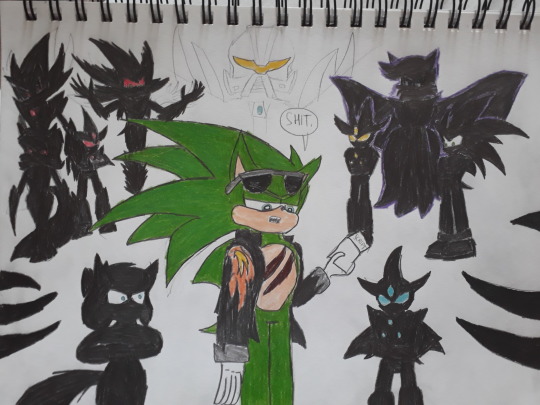
#Sonic the Hedgehog#Archie Sonic#Ian Flynn#Scourge the Hedgehog#Fiona Fox#Evil Sonic#Critical#CW: Abuse#TW: Abuse
17 notes
·
View notes
Text
Let Boys Love Girl Things
For a deeply depressed, angry, and vitriolic bisexual 20-something who stumbled out of a toxic 2-year intensive college program confused as fuck about his gender and hurting everyone around him, it is with no exaggeration that I say My Little Pony: Friendship Is Magic’s low-key stakes, warmth, humour, kindness, and utter lack of cynical irony was my first step on the road not only to recovery but coming even sort of close to having an accord with my identity. So I quite frankly I am exhausted that I have spent nine years being judged on the behaviour of a fandom group from 4chan.
Nine years ago there was a gross perpetuation of toxic masculinity where men were ridiculed en-masse for liking a “girl’s show,” a campaign of derision that only intensified as the worst elements of 4chan gave everyone the evidence they seemed to want to justify their snap-judgement that boys liking girls shows was fundamentally weird, gross, and worthy of censure.
We like to clap ourselves on the back for how woke we are now. There’s no discourse that says it is “skeevy” that men enjoy She-Ra, and petulant MRAs on Reddit getting upset about the show’s new ‘feminist’ agenda is considered to be representative of nothing other than petulant MRAs on Reddit, not the She-Ra fandom as a whole. Steven Universe is triumphed everywhere as a victory for better masculinity - without anyone ever noting that Steven would love every single moment of My Little Pony: FiM. He’d cry at the wedding, and he’d weep at the destruction of the library, and he’d think the Storm King was an effective villain while Connie rolled her eyes and tried and failed to point-out the weak characterization. Steven would cheer and cry every time a villain was redeemed through the power of love and friendship. Because he’s Steven, and he loves schmaltz, and it’s okay for a boy to like schmaltz.
If we truly believe that, as we say we do, it’s time let the habit of shaming boys who liked a cartoon show go. It’s been a decade.
Yes: MLP: FiM had a disgusting contingent of its fandom. You know what other franchise has that problem? A little film series you might have heard of called Star Wars. A contingent of Star Wars fandom was so racist it drove actors of colour off of twitter because it piled hate upon them. It was so misogynistic that somebody out there recut the entirety of The Last Jedi so that men save the day and all the women get reduced to bit parts. And yet if I see a Star Wars avatar my first assumption generally isn’t “oh you like Star Wars, so you must therefore be a misogynistic racist.” Because statistically speaking, you aren’t - just like, statistically speaking, the men who liked My Little Pony weren’t 4chan users. Not that most people bothered to find that out, because - shockingly - the worst elements had loud voices and got all the press, and the standard we applied to them was so entrenched in patriarchy that none of us wanted to accept that men could like the girls show without it being some gross violation of the proper order.
I’m tired of that. The show’s been on nine years - long enough that kids who grew up watching it are old enough to start entering “The Discourse Space,” and what kind of example do we want to set for them that a show that might have meant so much to them growing up is given a defacto label of deviancy?
”Adult males like this show about the little kiddie ponies - that’s so creepy.”
There’s a point I want to make here that I think really needs to be said so I am going to make it large
My Little Pony: Friendship is Magic is a show for children; it is not a show about children.
What do I mean by this? Adventure Time is the story of Finn, a 12-year-old. Steven Universe is a show about Steven Universe, a 12-year-old. Ok K.O. is a show about K.O. a 6-11 year-old. Avatar: The Last Airbender is about a group of kids aged 11-14. She-Ra is a show about Adora who is… 16-ish? 17? And so on.
MLP:FiM is a show about 20-somethings. It’s a show about a grad student, a small business owner, a baker, a farmer, an environmental technician, a… trust fund baby?*... and, later, a former dictator. Yes, there are some kid characters, but the primary cast are all young adults who’ve reached adulthood and found themselves having to learn over and over again all sorts of shit they really ought to have known by now but don’t. It is, in short, a story about Millennials: an entire generation who reached adulthood not knowing what that meant or how to cope. Every time you laugh at the characters and go “how do they not know this [obvious thing that is obvious to adults]” you do so while watching a children’s cartoon rather than paying your taxes because you’re still not sure how to do that properly and are just low-key freaking out about it and hoping the problem goes away on its own. I speak from experience. The list in endless: we might ridicule the ponies ignorance at social graces, but i’ve been on this hellsite long enough that I’m pretty sure most of you are social-anxious neurotics who cock-up just as often and just as spectacularly as any pony on the show.
I’ve grown up in-sync with these characters. I’ve seen them go from floundering at 20 to sorta getting their act together and coming to grips with adult life as they reach 30. I’ve seen them become successful, get new jobs, start new careers. There have been episodes about how to deal with parents who embarrass you, how to get your parents to understand that you’re an adult now and want to be treated that way. There str stories about how to handle deadbeat older brothers who won’t stop mooching off your emotional labour, and how to mourn parents who’ve died. There are also stories about the byzantine nature of school regulation. (If next season is all about Twilight Sparkle reforming the Equestrian tax code it will be entirely in keeping with the adult-life-trend the show has been on for a while.)
My point with all this is that the “liking the kid’s show” narrative is disingenuous in the way it frames fans as creepy. To get tu quoque about it all I could raise my hand and point at all you adults gushing about all these kid protagonists in your favourite cartoon shows and go “Isn’t that CREEPY and GROSS you DEVIANTS” and on and on and on.
But I won’t.
Because it was never really about that, was it? It’s never been about that.
It was, at first, about what it was and wasn’t okay for boys - for men - to like. As a kid who’d been mercilessly bullied for being even the tiniest bit effeminate, openly embracing the fact that I liked this show about the colourful cartoon ponies felt like painting a target on my back. As for the boys younger than me - the boys still in high school in 2010 and 2011 who openly embraced this show? Braver than any US marine. When this all started it was about policing what was ‘appropriate’ for boys - nobody gave the adult Transformers fandom the same kind of shit, I assure you. It was about patriarchy - and how unwilling we all were to let go of it, no matter how progressive we told ourselves we were. Just like any moral panic, it developed a far more disturbing tone of disapprobation because if a handful of fans on 4chan were creepy than surely all the fandom was creepy. I’ve had plenty of fun mail in my inbox as people with cartoon avatars told me my opinion was invalid because I had an avatar from a different cartoon show. If I had an MP avatar that made me a “brony,” which made me a creepy MRA edgelord. Never mind that I don’t even use the term, and haven’t since… well, since the grossest elements of 4chan got it tattooed on their phalluses and trumpeted it to the heavens as the calling card of their misogyny.
There was a moment, I think, back in the halcyon days of 2010 and 2011 where we could have taken this another way. Where, socially, the rise of boys watching ‘the girl’s show’ was treated as a breakthrough, as a paradigm shift, as something to be celebrated and nurtured instead of something to revile like an anti-homosexual PSA from the 1950s. “Can’t let the adult men near that children’s show, who knows what might happen. They might repeat the trends that all fandoms have done for decades upon decades - the horror!”
We could have been better - but we weren’t. We mocked, and clutched our pearls, and looked appalled, and in doing so we fed the trolls all the ammunition they’d ever need to turn themselves into The Poor Oppressed Babies who just wanted to be left alone to watch their ponies and belittle women in peace. So the gender-questioning bi boy trying to feel good about himself got rounded-up with the usual 4chan suspects because we both enjoyed the same television program.
Patriarchy is not an external force with its boot upon our necks: it is a collaborative social effort, reinforced both consciously and sub-consciously every day. The internet of the early 2010s was a very different place, and the decisions we made then still live with us today. If we want to stop the perpetuation of toxic masculinity, we have to ourselves cease to perpetuate it. There’s an entire generation of queer boys and non-binary boys and non-bro cis-boys - the kind who cry and care and give a shit about kindness - who have grown up on Steven Universe and Adventure Time and yes, My Little Pony: Friendship is Magic. These are boys who deserve to have a better place prepared for them than I had, one that isn’t still littered by the baggage of all the dumb stupid crap from 2010 and 2011.
It’s time to let the ghost of Toxic 4chan Fandoms Past go already, and let this show about cartoon ponies be free to entertain and delight without incurring a moral inquisition. Life is so bad right now, the news is so dire. Curl up with My Little pony: Friendship is Magic and let all its goodness, and kindness, and laughter, and caring carry you away and remind you that we can still tell stories about worlds in which those virtues are treasured. Let the show stand on its actual merits, and not the cultural lodestones of long-gone reprobates. And stop granting the phantoms of 4chan the power to say anything meaningful in 2019.
_________________
*Serious question: what does Fluttershy do for a living? Like, as her job? For most of the series? She’s the only one who doesn’t have a meaningful career, and after meeting her enabling parents you just know she’s been living off pre-existing savings for years (she’s thrifty like that).
[Note: this post was originally posted in this thread. It has since been re-edited and slightly modified.]
#my little pony#my little pony: friendship is magic#MLP#MLP FiM#steven universe#connie maheswaran#adventure time#4chan#patriarchy#gender roles#bisexuality#She-Ra#Avatar#Avatar the last airbender#atla#Adora#Fin the human#OK KO#K.O.#brony#bronies#twilight sparkle#fluttershy#rainbow dash#rarity#pinkie pie#applejack#starlight glimmer#millenials#long post
45 notes
·
View notes
Text
“Why do antis get so mad at people liking villains, it’s not like we’re whitewashing or woobiefying them”
It’s because there’s a little fandom phenomenon that TV Tropes rather helpfully calls Draco in Leather Pants, which is pretty much entirely fans liking villainous or otherwise horrible-in-canon characters and whitewashing their actions and woobiefying them and overall just not knowing how to appropriately enjoy villainous characters.
The trope name comes from (of course) Draco Malfoy from Harry Potter, who at the time the term was coined (IE before Half-Blood Prince and Deathly Hallows came out and developed his character) was just a bullying little shit with no redeeming qualities, yet was somehow a fan favorite character who would regularly get woobiefied and paired with characters like Hermione (even though, again, books 1-5!Draco had nothing to his character that could warrant any of this).
Other examples of this sort of phenomenon include Kylo Ren and General Hux in Star Wars, the Phantom of the Opera (who is commonly portrayed as a dark, romantic, and dreamy individual, but in the actual canon of Leroux’s text is a serial murderer and creepy abusive stalker, possibly even a rapist), Sephiroth in FFVII (see the trope page image), Dracula within the context of Bram Stoker’s novel (he was nothing more than a gross-ass monster there), and Lucifer/Satan in assorted media depictions (Milton’s Paradise Lost being a big one, and if I have to explain to you why the Devil is a villain you should be ashamed). These are the kind of characters where if you go to the source, they’re awful people who commit heinous deeds, but the deeper you go into derivative and fanmade works the more their actions get glossed over in favor of woobiefication.
That isn’t to say creating works with sympathetic, tragic villains is a bad thing - a lot of really great tragic works like Hamlet or The Count of Monte Christo are good specifically because they explore the consequences of sympathetic characters committing heinous deeds. The problem is when you refuse to actually acknowledge that they are villains or have done villainous things, and can’t handle your appreciation of them appropriately. It’s okay to like villains, but at some point you need to take a step back and think “Cool motive, still murder”.
Now, there are other factors, good and bad, involved in this kind of phenomenon. Sometimes, fandom bigotry can contribute to this situation (such as the many cited cases of fanworks about Kylo Ren and Hux outnumbering fanworks for characters like Finn and Poe, the heroes of the movie). Sometimes, the creator’s bigotry or the bigotry of the work’s home time period can cause this via values dissonance (no one likes to portray Shylock purely as a villain anymore, for example, due to the heavy anti-Semitism in The Merchant of Venice and how that’s kinda Yikes today). Sometimes the Umbridge Effect kicks in, and a given fan’s opinion on a villainous character can depend on whether or not that villain’s actions hit close to home for them (such as in the Evillious series, where the main villain protags include a serial kidnapper and rapist, a cannibal, a tyrant, a serial poisoner, a stalker and murderer, a hanging judge, and a genocidal dictator, and yet the only one people in the fandom straight up loathe is the serial rapist, while everyone else gets hit with this). Sometimes villainous characters just get hit with really bad writing and either don’t actually deserve getting treated as villains or are otherwise horrifically underutilized (like basically every manga-continuity Sailor Moon villain ever). And sometimes it’s just a cocktail of all these things and more, such as with The Traitor from Persona 5 (who’s in the weird place of being both a Draco in Leather Pants and its counterpart, Ron the Death Eater, due to shit like VERY bad writing on Atlus’s part and Umbridge Effect caused by loss of cultural context).
Usually, with some research and critical thinking, it’s possible to tell when a villain is genuinely sympathetic or if it’s a case of This Shit happening. The problem is when an incredibly large fandom refuses to think critically, which is why discourse about these types of characters keeps happening.
TL;DR People get mad when you like villains because there is a documented history of fandoms whitewashing and woobiefying villains and refusing to admit that they do wrong to the point where there is a fucking TV Tropes page on this phenomenon. If people are mad at others for whitewashing or woobiefying villains, they usually have a point, and it’s shitty to plug your ears and act like there’s a “purity crusade” going on instead of thinking critically about how you’re handling these characters. It’s okay to like villains, but you need to learn to appreciate them as villains, tragic or otherwise, and understand that ultimately their actions shouldn’t be condoned or glossed over just because you like them. Thank you for your time.
#/#//#///#////#/////#long post#rape mention //////////#sorry for the rant there i saw a post earlier and just HAD to say something on this shit
2 notes
·
View notes